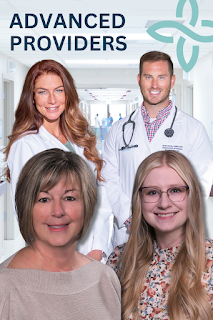We Are PAs
Written by:
Ashley Leutze MSPAS, PA-C
Tiffany Hayter DMS, PA-C
Daniel Cox MSPAS, PA-C
Information from https://www.aapa.org/about/what-is-a-pa/
If you have received medical care through Knox
Community Hospital, you may have encountered a PA (physician
assistant/associate). Many of us may be at Knox, but we play an
essential role. Patients have the right to choose their
healthcare providers and fully understand who cares for them.
In the 1960s, physicians and the American Medical Association recognized that there was a
shortage of primary care providers in America. Dr. Eugene Stead Jr. organized
the first PA class consisting of 4 students who were Navy medical corpsmen in
1965. The first PAs graduated from Duke University in 1967, and thus, the PA
profession was born.
Becoming a PA is a long, rigorous path. A bachelor’s
degree must first be completed, and then students must apply to a PA program. There
are more than 304 PA programs in the country, and admission is highly
competitive, with acceptance rates ranging from 2% to 30%, depending on the
program. Incoming students bring with them an average of more than 3,000 hours
of direct patient contact experience, which is required for admission to PA
school. The PA school curriculum is modeled on the medical school curriculum
and trains students as general practitioners, allowing PAs to
practice in a wide variety of specialties. PA programs are approximately 27
months (three academic years) and include classroom instruction and more than
2,000 hours of clinical rotations in family medicine, internal medicine,
obstetrics and gynecology, pediatrics, general surgery, emergency medicine,
psychiatry, and various electives. PAs graduate with a master’s
degree. Some PAs also go on to receive doctorate degrees or complete
residencies/fellowships, but these are not required to practice as a PA. After
graduation, PAs must take the national board examination, a 5-hour exam
consisting of 300 questions. After passing this, a PA receives the “PA-C” title, meaning they graduated and passed the boards. PAs must recertify their
boards every 10 years and must complete 100 credits of continuing education
credits every 2 years to continue practicing medicine and keep their medical
license.
We play a crucial role by expanding access to care and by transforming healthcare through patient-centered, team-based practice. We collaborate and work with physicians to provide a wide range of medical services in every medical specialty and setting. We diagnose and treat illnesses, develop treatment plans, prescribe medications, order and interpret diagnostic tests, conduct physical examinations, assist in surgeries, and perform procedures. Specific duties depend on the work setting, experience level, specialty, and state laws.
We specifically work in the Urology department at Knox Community. We see new patients and follow-ups in our office and manage any general urology condition, from BPH, kidney stones, and low testosterone to overactive bladder. We make rounds on patients in the hospital as well. We can assist in surgical procedures, and we are trained in a wide variety of office procedures such as cystoscopies, ureteral stent removals, bladder botox injections, difficult catheter placement, peripheral nerve evaluations, pelvic floor therapy, testosterone pellet insertions, aspiration of hydroceles, and percutaneous tibial nerve stimulation. We work alongside two phenomenal surgeons, Dr. Brown and Dr. Henry, to provide Knox Community Hospital with the most up-to-date urologic care.
We are proud to be PAs and to be serving the Knox community. PAs love talking about what we do and who we are, so say hi or wave when you see a PA.

.png)
